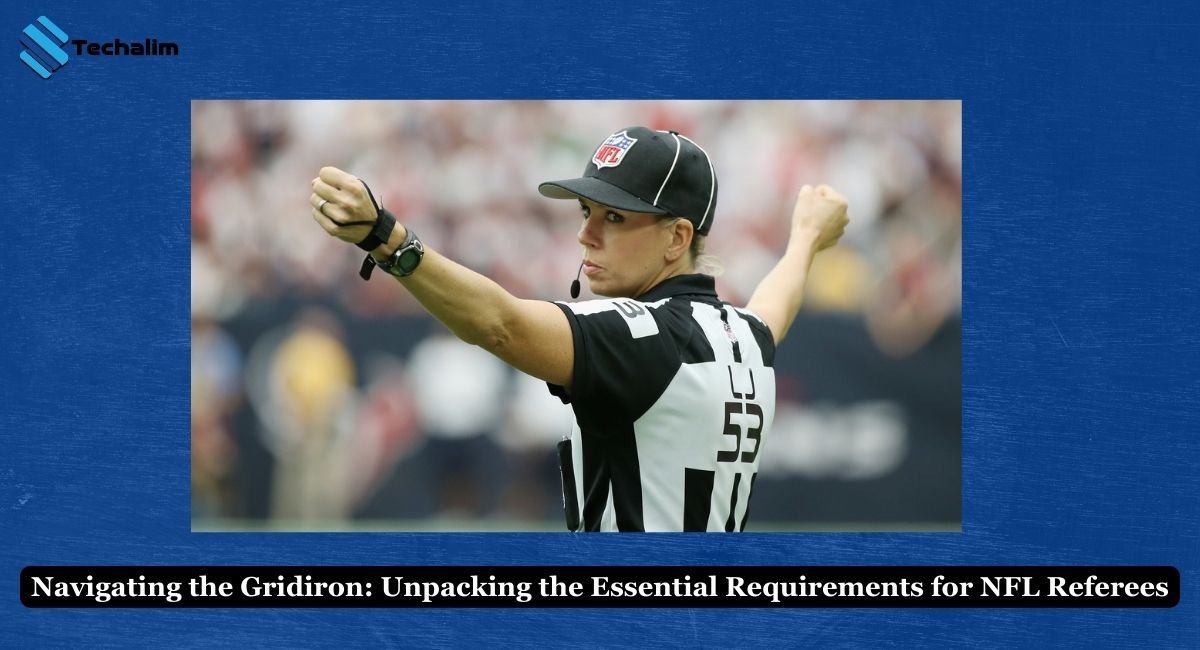Refereeing inside the National Football League (NFL) is a difficult and noticeably rewarding career. It demands a mixture of physical health, in-depth expertise of the game, outstanding choice-making competencies, and the ability to keep poise under tremendous pressure. In this complete guide, we delve deep into the prerequisites that aspiring NFL referees ought to meet to thrive in this annoying position, highlighting the significance of “Techalim” in their adventure.
NFL Referees: The Guardians of the Gridiron
Referees within the NFL hold the important obligation of ensuring fair play, protection, and adherence to the rules of the sport. Their choices can effect the outcome of a sport and the trajectory of a group’s season. Thus, the path to becoming an NFL referee is rigorous, with several key necessities that have to be fulfilled.
Educational and Background Essentials
To even be considered for an NFL referees position, candidates must possess a strong educational background and substantial experience in officiating football games. A bachelor’s degree is typically required, though the field of study is not strictly defined. Candidates with degrees in sports management, physical education, or any related field may find themselves at an advantage.
Experience is paramount in this line of work. Aspiring NFL referees usually start their careers officiating high school football games, gradually moving up to college-level games. It is generally expected that they spend several years honing their skills in collegiate football before they are deemed ready for the big league.
In-Depth Knowledge and Continuous Learning
A comprehensive understanding of the NFL rulebook is non-negotiable. Referees must memorize and be able to accurately and quickly apply hundreds of rules, definitions, and exceptions during the high-pressure moments of a game. This requires constant study, even for the most seasoned referees, to keep up with annual rule changes and points of emphasis.
Workshops, seminars, and training camps are integral to a referee’s continuous education. These events provide a platform for learning, discussion, and practical application of the rules. Here, the concept of “Techalim” comes into play, embodying the principle of continuous improvement and mastery in the field of NFL officiating.
Physical Fitness and On-Field Agility
NFL video games are speedy-paced, and referees need to be in remarkable bodily condition to keep up with the play. They undergo rigorous health checks that investigate their speed, agility, and patience. These tests are conducted often to ensure that referees preserve their bodily standards in the course of their career.
On-discipline agility is just as vital as physical health. Referees should be capable of positioning themselves optimally to always have a clean view of the play and make accurate calls. This calls for a deep knowledge of recreation strategies and participant actions, in addition to the capacity to make cut-up-2nd selections on positioning and motion.
Communication and Teamwork
Effective verbal exchange is a cornerstone of successful refereeing. NFL referees work as part of a team, and their potential to talk in reality and decisively with fellow officials is important. They also want to engage with players and coaches in a respectful and authoritative manner, handling conflicts and preserving the game.
Teamwork extends past the sphere. Referees participate in pre-game briefings and submit-sport debriefings, where they talk about game techniques, capacity challenges, and review their performance. This collaborative method guarantees consistency in officiating and fosters a subculture of non-stop learning and development.
Handling Pressure and Maintaining Integrity
The pressure on NFL referees is immense. Every call they make (or don’t make) is scrutinized by millions of viewers, as well as players and coaches. Referees must possess the mental fortitude to make unbiased decisions swiftly and confidently, irrespective of the game situation or potential backlash.
Integrity is the bedrock of a referee’s credibility. The NFL places a strong emphasis on maintaining the highest ethical standards. Referees must be impartial, transparent, and committed to upholding the integrity of the game. Any breach of these principles can result in severe consequences, including suspension or termination.
Advancement and Evaluation
Becoming an NFL referees is an adventure, not a vacation spot. Officials are constantly evaluated on their performance, with the top-acting referees being assigned to playoff video games and ultimately the Super Bowl. These assignments are considered the pinnacle of an NFL referee’s profession, and they underscore the importance of excellence and consistency in officiating.
Continuous assessment and comments are essential to a referee’s improvement and development. Performance opinions, video analyses, and peer reviews offer referees treasured insights into their overall performance, highlighting regions of power and possibilities for development.
Read More: How to become an NFL referees




